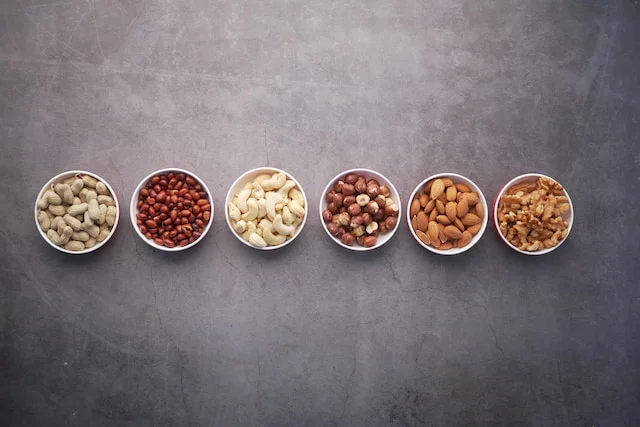Proteins are crucial macronutrients that play a vital role in various bodily functions, including tissue repair, enzyme production, and immune system support. Incorporating high-protein foods into your diet is essential for overall health and well-being. In this comprehensive guide, we’ll explore a variety of foods that are exceptionally rich in protein.
1. Lean Meat: A Protein Powerhouse
Lean meats are excellent sources of high-quality protein, offering an array of essential amino acids necessary for muscle growth and repair.
Examples of Lean Meats:
| Food | Protein Content (per 100g) | Fat Content (per 100g) | Calories (per 100g) |
|---|---|---|---|
| Skinless Chicken | 31g | 3.6g | 165 |
| Turkey Breast | 29g | 1g | 135 |
| Lean Beef (Top Sirloin) | 31g | 4g | 164 |
| Pork Loin | 29g | 5g | 143 |
Health Benefits:
- Rich in Essential Nutrients: Lean meats are packed with essential nutrients like B vitamins (particularly B12 and niacin), iron, and zinc.
- Supports Muscle Health: The high-quality protein in lean meats aids in muscle repair, growth, and maintenance.
2. Fish and Seafood: Protein with Omega-3 Fatty Acids
Fish and seafood are not only rich in protein but also provide valuable omega-3 fatty acids that support heart health and brain function.
Examples of Protein-Rich Fish:
| Food | Protein Content (per 100g) | Fat Content (per 100g) | Calories (per 100g) |
|---|---|---|---|
| Salmon | 20g | 13g | 206 |
| Tuna | 30g | 1g | 144 |
| Cod | 18g | 0.6g | 82 |
| Shrimp | 20g | 0.5g | 99 |
Health Benefits:
- Omega-3 Fatty Acids: Fatty fish like salmon are rich in omega-3s, which support heart health, brain function, and reduce inflammation.
- Low in Saturated Fat: Fish is generally low in saturated fat, making it a heart-healthy protein option.
3. Eggs: Nature’s Protein Powerhouse
Eggs are an incredibly versatile and nutritious source of protein, providing an array of essential nutrients.
Nutritional Content of Eggs:
| Food | Protein Content (per 100g) | Fat Content (per 100g) | Calories (per 100g) |
|---|---|---|---|
| Whole Egg | 13g | 11g | 155 |
| Egg White | 11g | 0.2g | 52 |
Health Benefits:
- Complete Protein: Eggs contain all essential amino acids, making them a complete protein source.
- Rich in Choline: Choline is essential for brain health and is abundant in egg yolks.
4. Dairy Products: Protein and Calcium
Dairy products are excellent sources of protein and provide essential nutrients like calcium and vitamin D.
Examples of Protein-Rich Dairy Products:
| Food | Protein Content (per 100g) | Fat Content (per 100g) | Calories (per 100g) |
|---|---|---|---|
| Greek Yogurt | 10g | 10g | 146 |
| Cottage Cheese | 11g | 4g | 98 |
| Mozzarella Cheese | 28g | 22g | 318 |
| Milk (1% Fat) | 3.4g | 1g | 42 |
Health Benefits:
- Calcium and Vitamin D: Dairy products are crucial for bone health due to their high calcium content, which is also fortified with vitamin D.
- Probiotics (in Yogurt): Yogurt contains probiotics that support gut health and boost the immune system.
5. Legumes and Plant-Based Proteins: A Plant-Powered Option
Legumes and plant-based proteins are excellent alternatives for vegetarians and vegans, providing a wealth of protein and other essential nutrients.
Examples of Plant-Based Proteins:
| Food | Protein Content (per 100g) | Carbohydrate Content (per 100g) | Fiber Content (per 100g) | Calories (per 100g) |
|---|---|---|---|---|
| Lentils (cooked) | 9g | 20g | 8g | 116 |
| Chickpeas (cooked) | 8.9g | 27g | 4.8g | 164 |
| Tofu | 8g | 4.8g | 1.9g | 72 |
| Quinoa (cooked) | 4.4g | 19g | 2.8g | 120 |
Health Benefits:
- Rich in Fiber: Legumes are high in fiber, supporting digestive health and promoting a feeling of fullness.
- Complete Protein (in Quinoa): Quinoa contains all essential amino acids, making it a complete protein source.
Diverse Protein Sources for a Balanced Diet
Incorporating a variety of protein-rich foods into your diet ensures you receive a wide range of essential nutrients. From lean meats and fish to plant-based options like legumes, there are numerous ways to meet your protein needs while supporting overall health. It’s important to balance protein intake with other macronutrients and maintain a varied, nutritious diet for optimal well-being.






